|
A group of women from the Saheli Asian Women’s Centre take a day trip to Blackpool. There’s a clash between traditional and modern ideas among the older and younger women in the group. Simi (Shaheen Khan), the Centre coordinator, is an outspoken feminist, which the older women object to. Ginder (Kim Vithana) is a single mother, escaped from her abusive husband, who is after her. Hashida (Sarita Khajuria) hopes to go to medical college, but she’s been secretly seeing Afro-Caribbean Oliver (Mo Sesay) and has just found out she’s pregnant. Asha (Lalita Ahmed), a Bollywood fan to the extent of dreaming Bollywood production numbers, finds her humdrum life is about to change...
In 2019, when her new film Blinded by the Light was released, Film Stories magazine pointed out that Gurinder Chadha was the most commercially successful British film director of her time and she had never been on the cover of a film magazine. So now she was. Bhaji on the Beach, released in 1993, was her first feature, written by Meera Syal from a story by them both. With this film, Chadha became the first British-Asian woman to direct a feature film, or at least one longer than an hour*.
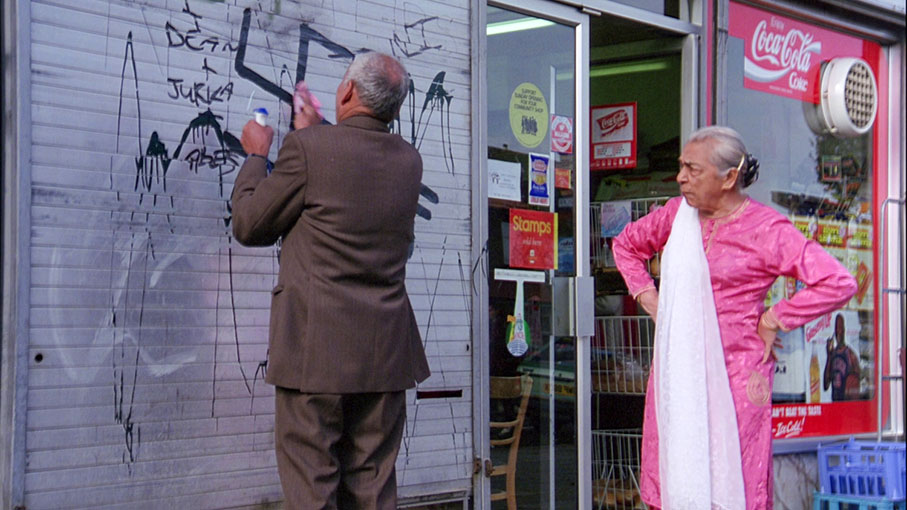
Chadha was born in Kenya to Punjabi Sikh Khatri parents. Following political turbulence in Kenya before independence, the family relocated to the UK, her father first, then the rest of them in 1962, settling in Southall, West London when Gurinder was two. Many of her films have dealt with her sense of being of two cultures, both Indian and British at the same time, while including these films in popular genres so as to put them across to a wider audience. Her first big hit, Bend It Like Beckham (2002) was a key stage in the rise to stardom of a white actress, Keira Knightley, but the film revolves around an Indian girl (played by Parminder Nagra) and her Sikh family. Bride and Prejudice (2004) is an Indian take on Jane Austen, and Viceroy’s House (2017) is a historical drama dealing with India’s independence in 1947. With Angus, Thongs and Perfect Snogging (2008), she catered for a demographic well served in books (it’s based on two novels by the late Louise Rennison) but much less so in British cinema, namely tween- and teenage girls.
Bhaji on the Beach was commissioned by Channel 4 following Chadha’s debut film, the documentary short I’m British But… A meeting with Meera Syal led to A Nice Arrangement and both of these shorts are included as extras on this disc. Bhaji on the Beach is an ensemble piece, with most of the ensemble British-Asian women of various ages. The film starts as it means to go on, with a camera glide past Indian-owned shops (set in Birmingham though rather obviously shot in Southall), all well and good until you see the racist graffiti, including swastikas and NF (National Front) signs, daubed on the walls. While Bhaji on the Beach is a comedy-drama with elements of romance, there is a serious side to it which isn’t ignored and the film isn’t blind to differing attitudes between generations. The older women disapprove of the more westernised younger ones. This community can be and is the target of racism from without but it doesn’t avoid discrimination towards other groups. It’s not acceptable for Hashida to have a boyfriend who isn’t Asian but Black, and that’s before she fell pregnant by him. Another cultural taboo tackled is separation and potential divorce, in Ginder’s story. Meanwhile, Asha finds fellow-feeling with eccentric widowed actor Ambrose (Peter Cellier).
Chadha directs with a light touch, though the film does tend to run out of steam towards the end. That said, it’s an engaging debut feature for someone who was to become a leading figure in commercial British cinema and remains so to this day. The film was released in the UK during the decidedly unseasonal month of January 1994. It was nominated for a BAFTA for Best British Film, which was won by Shallow Grave. Gurinder Chadha was awarded the OBE in 2006.
Bhaji on the Beach is released in Blu-ray by the BFI, a disc encoded for Region B only. The film had a 15 certificate in cinemas and retains one on disc. I’m British But… was a U in cinemas and is now PG, while A Nice Arrangement was a cinema PG. Holiday and London Me Bharat are documentaries with nothing that would have more than a PG, so are exempted from certification, though the former was a U on its cinema release. Previous BFI discs have included captions at the start of particular items advising of racial or other discriminatory language, domestic and/or sexual violence, but on this disc the advisory is included in the boilerplate which appears when the disc starts, that comments in interviews and commentaries are those of the person concerned and not those of the BFI.
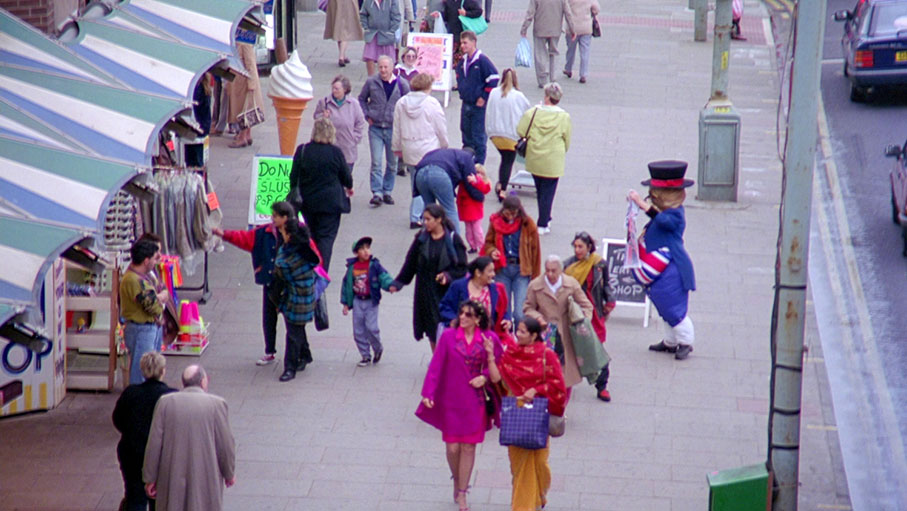
The film was shot in 35mm colour on Fuji film stock and is transferred in a ratio of 1.78:1. It would have been shown in British cinemas most likely in 1.75:1 but may have been composed for 1.85:1. The Internet Movie Database says the latter, but that should be taken with a pinch of salt. The transfer is either cropped a little or opened up a little, but there’s nothing in it either way. The film was shot with quite an eye for colour by John Kenway, and that comes over well; those colours are suitably vibrant and grain is natural and filmlike.
The original Dolby Stereo soundtrack is rendered as LPCM 2.0. There’s not much use of the surrounds other than the music, but dialogue, that music and sound effects are well balanced. There are three subtitle options available: those translating the small proportion of non-English dialogue (Punjabi and a few lines of Sanskrit), English hard-of-hearing subtitles and none. I’m pleased to say that this is the case with all the extras as well, even the silent footage of Blackpool, where the subtitles identify the music on the soundtrack and tell us when it ends.
I’m British But… (28:50, 31:55 with introduction)
Gurinder Chadha’s first film was this short 16mm documentary made for the BFI and Channel 4 in 1989, which had a cinema release. Chadha was part of the BFI’s New Directors scheme and the film was made with a budget of £20,000. Quite likely coincidentally, it’s a companion piece to London Me Bharat seventeen years earlier (see below) in that it under half an hour it gives us a portrait of Asians in Britain, though not just in London. However, updatings in the time include colour rather than black and white and more of an emphasis on a younger crowd and their fashions and music. Three and a half decades later, that makes this film something of a time capsule. Chadha insisted that the film have its premiere at the Southall Community Centre.
As with the earlier film, the people interviewed are from all over the subcontinent, and include Hindus and Muslims as well as Sikhs like the director. And not just India, but Pakistan and Bangladesh too. But ask them to define themselves, as Chadha does near the start, and they’re British, Welsh, Scottish, Northern Irish. The film was made when Margaret Thatcher was in power, and some interviewees note that there had been a rise in nationalism over the previous decade. One man from Wales had the farmhouse his family owned burned down by white racists. Some of the older people remember the British Empire and in particular the Amritsar Massacre, of which we see still photographs. Ultimately, wherever she and her subjects “come from”, Chadha’s film is a celebration. There’s no but in it.
I’m British But… is presented with an optional introduction by Shani Dhanda, which forms the first chapter of this title on the disc. The film itself its presented in a ratio of 1.33:1 at 25fps, the latter presumably its native speed due to its televisual origins.
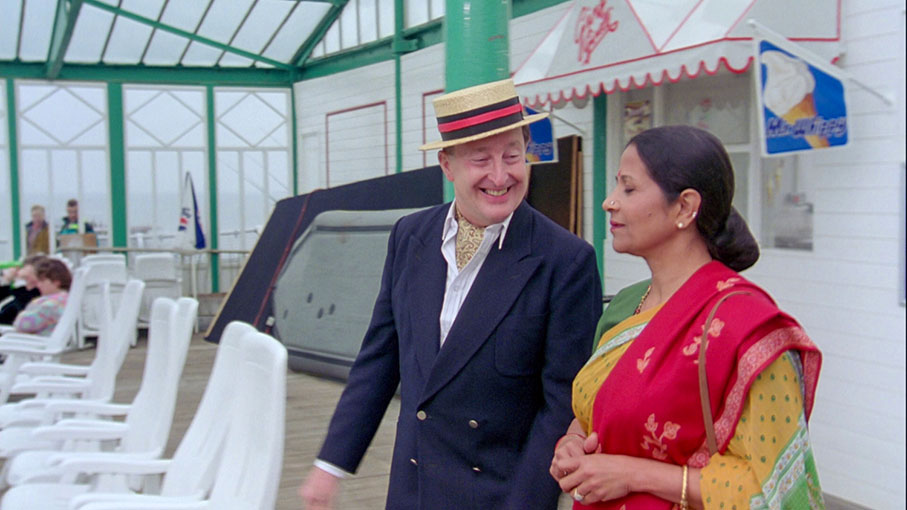
A Nice Arrangement (10:52)
From 1990, A Nice Arrangement was made for Channel 4 for their Short and Curlies strand (named after Mike Leigh’s film of that title), though it had cinema showings. It was written by Meera Syal from a story by her and Chadha, and Syal played the protagonist’s Auntie Sita. That protagonist is Meena (Tania Rodrigues), on the morning of her wedding day. It’s an arranged marriage: Meena previously had a Muslim boyfriend but that relationship ended due to cultural differences. However, Sita had some scandal of her own in the past. The film’s serious subtext is not in doubt (not least the casual racism of the family’s white neighbours) but it plays as light comedy, packing a lot into its eleven minutes.
Shot in 35mm, A Nice Arrangement is transferred in a ratio of 1.66:1. Again no doubt due to its televisual origins, it plays on this disc at 25fps.
First Film of Blackpool (1:24)
As it says, the earliest known footage of Blackpool, two shots, from circa 1898. That “circa” is explained in a little piece of detective work in the (unsigned) booklet notes. We see Blackpool Tower, but that opened to the public in 1894, however, the trams we see have no overhead wiring, which was introduced in 1899 due to bad weather causing corrosion and short-circuiting. This footage is in pretty bad shape, with plenty of damage, and it’s in black and white to the extent where it’s all blacks and whites and no shades of grey in between, but as ever let’s be grateful that it survives at all.
Holiday (18:02)
This 1957 travelogue has done service on previous BFI discs before: it’s on the Blu-ray of A Taste of Honey from 2018’s Woodfall set and also turned up in HD on Best of British Transport Films Volume 2 and no doubt on a previous DVD the latter was selected from. However, given thethe likes of me, reviewing them), here it is again. Directed by John Taylor, Holiday takes us round the sights of a Blackpool seaside holiday, on the beach by day and fireworks at night, with minimal narration and a soundtrack largely taken up by jazz standards played by Chris Barber and his band. Ralph Sheldon’s editing takes its cue from the music, with divers entering water and cymbals being struck in unison. It was shot in colour 16mm by David Watkin who, instead of taking the traditional path of beginning as a tea boy and working his way up through the camera crew before becoming a director of photography, earned his chops in documentary before becoming one of Britain’s leading cinematographers in the next decade.
Holiday is transferred in a ratio of 1.33:1 (it’s likely to have been cropped when shown in cinemas blown up to 35mm) at 24fps with mono sound.
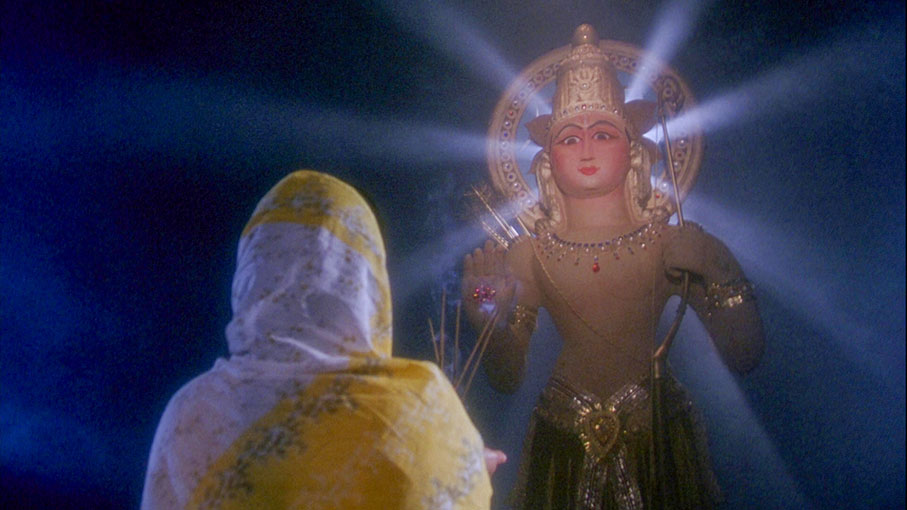
London Me Bharat (20:01)
This short documentary from 1972, directed by Vinod Pande and shot in 16mm black and white, was the first Hindi-language film shot in Britain. The title forms the last words of the commentary and means “India in London”. It’s a portrait of Southall in West London, at the time home to one of the largest Indian communities in the country and home to a young Gurinder Chadha and her family. Indian music plays over shots of London sights – Trooping the Colour, Big Ben, Trafalgar Square – and we relocate to Southall and shops owned by some of the 150,000 Indian migrants then living in the capital. As with I’m British But… they come from all over India, with different cultural backgrounds and languages spoken. It doesn’t aim to “explain” these people to non-Indians, as other documentaries might have done, nor does it deal much with racism that no doubt many of these people would have experienced. Instead, it’s a story from the inside, aimed at other Indian and Indian-diapora people, some of whome might have been considering relocating to London.
London Me Bharat is transferred in a ratio of 1.33:1 with mono sound. The soundtrack is entirely in Hindi, other than when local leader Sidney Bidwell talks to camera in English – the voiceover then translates what he says. Given that this might well have been shown in cinemas, the transfer runs at 24fps.
Gallery (4:55)
A self-navigating gallery of stills and documents from Gurinder Chadha’s collection in the BFI National Archive, covering her two shorts as well as the feature. So we have stills for I’m British But… and A Nice Arrangement, and a publicity card for the latter. The front page of a budget statement for what was then called A Bhagi [sic] on the Beach follows, with two days’ shooting schedules, which includes information you might not have thought about, such as the times of sunrise, sunset and high and low tides. There are stills, a poster and a letter of thanks from Chadha to Channel 4’s David Aukin.
Booklet
The BFI’s booklet, available with the first pressing of this release only, runs to thirty-two pages plus covers. Following a warning of possible plot spoilers, it begins with Gurinder Chadha’s director’s statement, beginning with the making of I’m British But… Karin Barnborough, commissioning editor at Channel 4, saw and liked the film and approached Chadha, introdusing her to Meera Syal. Chadha says that when her father migrated to the UK in 1958, he had worked for Barclays Bank in Nairobi but was laughed out of the place when he applied for the same job for the same company in London. So that Barclays in Southall became the repository for her first feature film’s £1 million budget. She is clearly proud of Bhaji on the Beach, calling it a landmark and pleased that a film she might never have been able to follow up and which she hoped that people like her and her cousins would like clearly played to a wider audience. She’s delighted that a younger generation have found her and her film an inspiration.
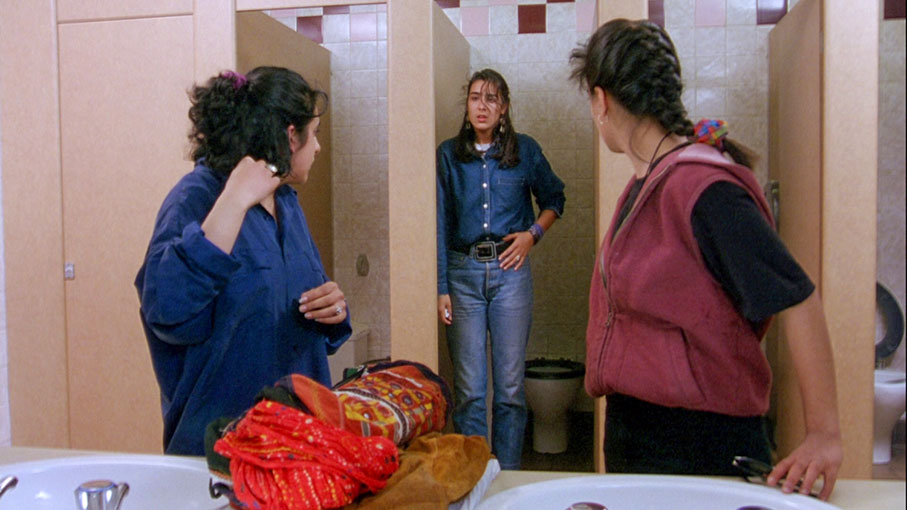
Kohinoor Sahota is next, with “Why Bhaji on the Beach Still Speaks to British Asian Women Today”. Sahota is herself second-generation British Asian and talks about how much the film meant, the first time she’d seen one written and directed by British Asian women. This was a time when representation on screen didn’t go much further than Indiana Jones and the Temple of Doom, though they included late-night Indian films on Channel 4 and Bollywood videos could be rented from local shops. While Bhaji on the Beach shows the positives about the community, and plenty of code-switching (not least the Punjabi version of “Summer Holiday” you hear on the soundtrack, lyrics translated by Gurinder Chadha) it isn’t blind to the darker sides, with abortion, domestic violence and outright racism all included. Patriarchal attitudes are certainly present, particularly towards the younger and more westernised women in the film. More than thirty years later, Sahota points out, things have changed but much has stayed the same as a pendulum swings back and forth: the rise of Islamaphobia at the time of the first Muslim Mayor of London (and a Hindu Prime Minister), #MeToo followed by the backlashes of the Tradwife movement and the toxic likes of Andrew Tate. In many films (often written by men), Asian women have been in the background and reduced to stereotypes, and many actresses have had to go abroad to find decent work. But films like Bhaji on the Beach were still made, and hopefully more will be.
Jessica Boyall contributes “Seeking Sun, Sea and Solidarity”. She begins by saying that Bhaji on the Beach came at a turning point in British film history. In 1990 Margaret Thatcher resigned as Prime Minister, having been in power since 1979, though despite that British films clearly in opposition to her had thrived during the 1980s. Channel 4 in 1992 ceased to be an ITV subsidiary and had to generate its own revenue, with a big impact on the films it financed and showed. (The often wildly experimental and innovative content many of us remember from 4 in the 1980s would soon be a thing of the past.) However, while Chadha’s film amply filled a multicultural remit, her sensibility was clearly towards more commercial films, of the kind she has gone on to make. She has not been interested in articulating the experiences of herself alone, but to include those of others in the film. Boyall traces her collaboration with Nadine Marsh-Edwards from the Sankofa collective, who went on to become her producer on Bhaji on the Beach. While the film is informed by Chadha’s “sense of fun” it also explores major taboos in the community: mixed relationships and separation and divorce. While it’s on the surface a film in the tradition of British realism, it also has brief dream/fantasy interludes more akin to Bollywood.
Following a cast and crew listing, the BFI’s John Ramchandani contributes his family’s recipe for onion bhajis. Credits are given for the extras, with notes on the films as follows: Simran Hans on I’m British But…, Rachel Pronger on A Nice Arrangement and London Me Bharat, and Steven Foxon on Holiday. There are also plenty of stills.
An engaging comedy drama, Bhaji on the Beach stands up very well over thirty years later. The BFI do a good job of showcasing it on this Blu-ray release, which includes some worthwhile shorts, including two earlier ones from the same director.
|